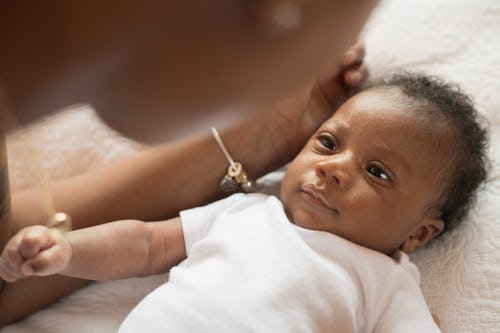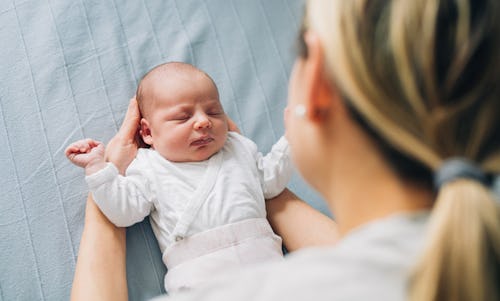
Newborns are full of weird little quirks — they sometimes blow bubbles in their sleep, prefer to bury their little faces into your chest while snoozing, and will eat your face if you’re not careful. So, if you’re staring adoringly at your new baby and notice their tiny chin trembling, you’re definitely going to wonder, why does my baby’s jaw quiver like that? If you’ve made sure they’re plenty warm, well, what gives?
When you Google about your baby’s quivering little chin, you wind up reading some things that feel sort of like answers but not quite: that having a chin tremble is a normal reflex for little babies and the result of an immature nervous system. Which, if you had a full-term baby who is otherwise healthy can make you feel like, “Um, excuse me?”
Why does my baby’s jaw quiver?
First things first: it’s normal and not a reason to freak out. “It’s quite common to see small tremors or tremulous activity in babies. For the most part, the majority of the time, those kinds of movements are quite normal,” says Dr. Jae Kim, M.D., PhD, pediatric neonatologist at Cincinnati Children’s Hospital. “Whether it’s a chin that's having a little bit quivering, or if it’s part of a limb, which is often the most common appearance for tremulousness or tremors, all of that is well within the scope of what we see in normal, healthy babies. Over time, it should disappear.”

“It could be a part of brain development where the brain is rapidly growing that can cause nerves to twitch,” says Dr. Peily Soong, M.D., a pediatrician at Children’s of Alabama. “Infants hiccup a lot, and this is now thought to be due to the brain developing and causing the diaphragm muscle to contract, causing a hiccup. The chin trembling may be related to something like this. Another possibility is infants have primitive reflexes that go away within a few months of life, and this just may be one of those reflexes.”
Hearing that your baby’s nervous system is in some way immature can sound a little alarming. But it’s just the medical way of saying their brain is still forming and growing, which is, of course, very normal. “An ‘immature nervous system’ just means that the pathways in the brain that help to do things like see, smile, walk, talk, learn, et cetera, are still developing,” says Soong.
In the vast majority of babies, Kim says a trembling chin is a totally “benign” event (meaning nothing is wrong and it’s not indicative of anything other than a growing brain). In some cases, doctors do believe medications taken during pregnancy can cause some abnormal movements in newborns, according to Kim, though none have ever been connected to trembling chins specifically.
“A lot of moms who are on specific antidepressants, the babies may present with a little bit of that kind of jitteriness or tremors. Depending on the class of medication that they’re on, there may be some data to associate that with the movement abnormality,” he says. For example, SSRIs have been associated with making newborns jittery after birth, Kim adds, though it will also go away with time.
When does the newborn chin tremble go away?
This odd little behavior usually goes away by the time your baby is 4 to 6 months old, Soong says. “I would only worry if this quivering doesn’t go away, if it seems more pronounced, or if your child has other abnormal jerking movements after 4 to 6 months.”
Kim’s timeline is a little shorter. “The key thing for a parent is, if they see something like a quivering chin, that quivering chin should be getting better, less frequent, and disappear within a month or so. Certainly after a couple of months, if that’s [happening consistently] it would be very uncommon.” In incredibly rare instances, Kim says, trembling can be a sign of seizures in infants (though he’s quick to add that a shaky chin specifically has never been a sign of seizure he has observed before).
So, if your newborn’s chin has a little shaky-shake going on, don’t panic. It’s extremely likely that it’s just an outward sign of all the development still taking place inside your little miracle’s brain and body.
Experts:
Dr. Peily Soong, M.D., a pediatrician at Children’s of Alabama
Dr. Jae Kim, M.D., PhD, pediatric neonatologist and co-director of the Perinatal Institute at Cincinnati Children’s Hospital
0 comments:
Post a Comment